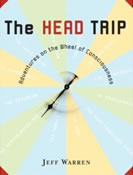Take a trip through the science – and experience – of altered states of consciousness in Jeff Warren’s absorbing new book: The Head Trip.
Sleep is one of the most fascinating altered states of consciousness in which we spend a third of our lives. It’s also the area that has the most research findings and it’s where Jeff Warren starts his fascinating journey around what he calls the ‘wheel of consciousness’.
This book is not just an exploration of the science though, it is also a personal journey.This book is not just an exploration of the science though, it is also a personal journey as Warren falls asleep in the sleep lab, practices lucid dreaming at a retreat in Hawaii and tries to learn meditation in Scotland (unsuccessfully!). His personal experience is interwoven with insights from both the psychological literature and interviews with big names in the science of altered states.
Unfortunately nowadays there’s a pervasive feeling amongst scientists that it’s a bit wacky to be studying or writing about altered states of consciousness like lucid dreaming, out of body experiences, hypnosis and even sleep. It’s too subjective, too personal for science to really have any role to play. That’s a pity because respected researchers have been working in some of these fields for decades and there are some very interesting findings.
To give you a flavour here are some of the altered states that Warren investigates on his journey:
- Hypnagogic: a transitionary state before we go to sleep when we often experience mild hallucinations.
- Slow wave sleep: deep sleep when our body grows and repairs itself. We do seem to dream a little in this state, but the dreams themselves are usually unspectacular. People woken for this phase report dreaming about getting ready for exams and other mundane activities.
- The ‘watch’: a period of ultra-relaxed wakefulness occurring in the middle of the night that is mainly experienced by cultures whose rest and activity patterns follow the sun.
- REM dreams: A lighter type of sleep where we do our most creative dreaming. This is where all the bizarre stuff happens.
- Lucid dreaming: this state is difficult to enter, but magic if you can do it. Suddenly you control everything: you can do what you want and it all seems absolutely real, not like a normal dream at all.
- Hypnopompic: the mirror image of the hypnagogic – a transitionary stage after we wake up when, again, we can experience mild hallucinations.
- Trance: well-known to anyone who’s seen a hypnotist in action.
- Sensorimotor rhythm: a goal of neurofeedback ‘brain training’ that is thought to help people such as those with attention disorders to concentrate. Creates a clear, calm and focussed state of consciousness.
- The Zone: also called ‘flow’ by psychologists. A high arousal, high concentration state when everything clicks. The Holy Grail for people playing sports.
- Pure conscious event: very hard to articulate. This is a highly focussed state usually achieved through meditation where the brain’s continuous chatter is dialled right down to nothing and we can just be.
Sounds fascinating, right? A couple of words of warning though. As Warren himself admits, he is preoccupied with what he calls the ‘special effects’ of consciousness – the amazing and unusual things the brain can do that we don’t normally experience. He’s also – as he’s the first to admit – somewhat impatient. These traits aren’t necessarily short-comings though, perhaps they’re even necessary for helping to cut through the mysticism that sometimes surrounds altered states of consciousness.
The Head Trip is an easy read, manages to slip you some science and also keeps the energy up as it travels through these weird and wonderful states of consciousness. Recommended. And not just for bed-time.
» Buy The Head Trip by Jeff Warren from Amazon.com.

